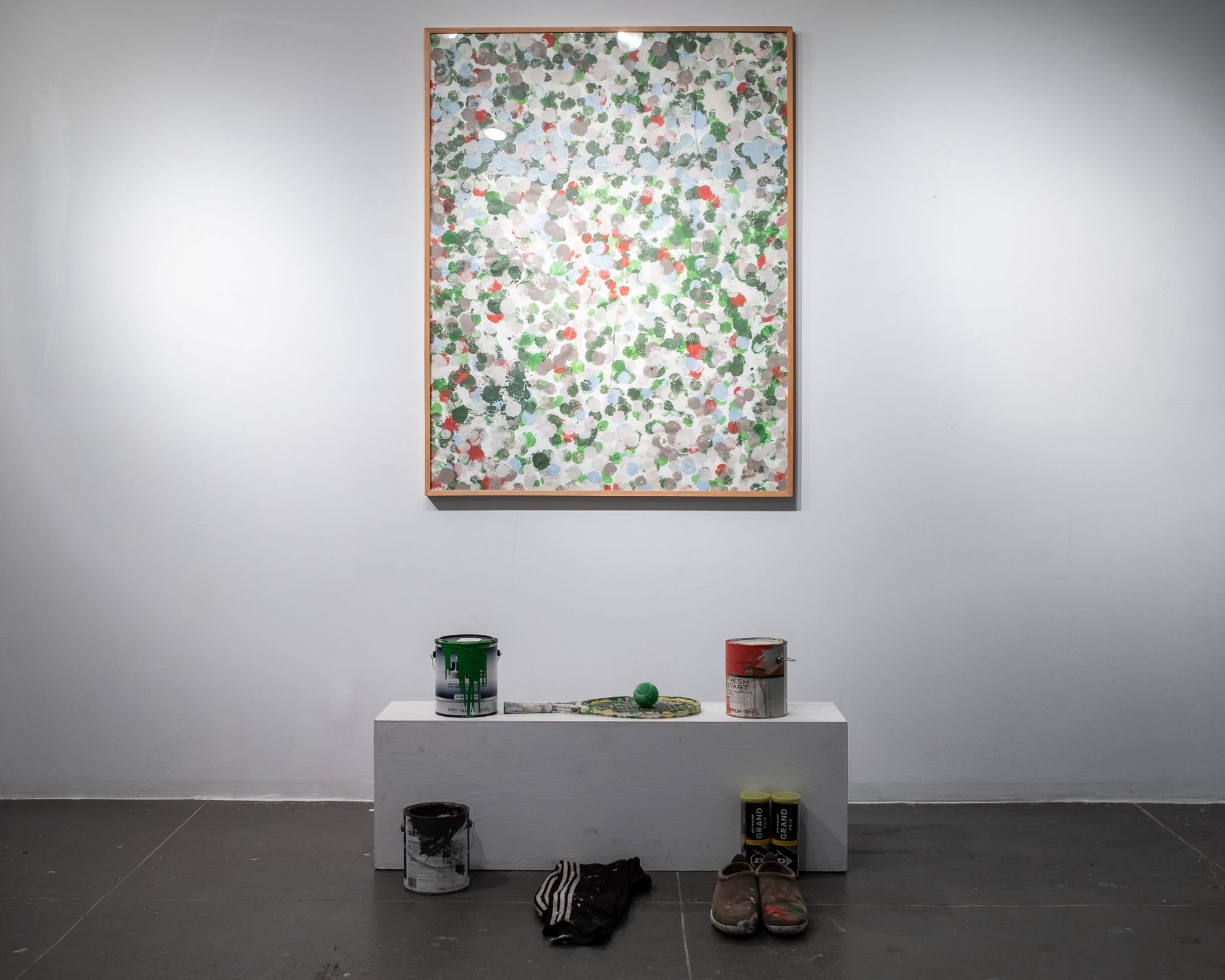How I Went Jank…
Join us on Zoom this month for artists Kamari Carter and Lamar Robillard, in conversation with Anaïs Duplan, Dellyssa Edinboro, and John Engelbrecht, co-presented by the Center for Afrofuturist Studies. Carter and Robillard will discuss their work, contemporary practices, and experience as part of the Jank Museum project at EFA Project Space in December 2021.
RSVP for the Zoom link via Eventbrite
Image: Lamar Robillard, Tennis Painting IV: Game, Set, Melancholy (Naomi Vs Serena), 2021, Linen canvas, enamel house paint, acrylic, Plastisol ink, 56 9/16” x 44 5/16”
Bios:
Kamari Carter (b. 1992) is a producer, performer, sound designer, and installation artist primarily working with sound and found objects. Carter's practice circumvents materiality and familiarity through a variety of recording and amplification techniques to investigate notions such as space, systems of identity, oppression, control, and surveillance. Driven by the probative nature of perception and the concept of conversation and social science, he seeks to expand narrative structures through sonic stillness. Carter’s work has been exhibited at such venues as Automata Arts, MoMA, Mana Contemporary, Flux Factory, Fridman Gallery, Lenfest Center for the Arts, WaveHill and has been featured in a range of major publications including ArtNet, Precog Magazine, LevelGround and WhiteWall. Carter holds a BFA in Music Technology from California Institute of the Arts and an MFA in Sound Art from Columbia University.
Anaïs Duplan is a trans* poet, curator, and artist. He is the author of a forthcoming book of essays, Blackspace: On the Poetics of an Afrofuture (Black Ocean, 2020), a full-length poetry collection, Take This Stallion (Brooklyn Arts Press, 2016), and a chapbook, Mount Carmel and the Blood of Parnassus (Monster House Press, 2017). His writing has been published by Hyperallergic, PBS News Hour, the Academy of American Poets, Poetry Society of America, and the Bettering American Poetry anthology. Duplan is the founding curator for the Center for Afrofuturist Studies, an artist residency program for artists of color, based in Iowa City. As an independent curator, he has facilitated artist projects in Chicago, Boston, Santa Fe, and Reykjavík. Duplan’s video and performance work has been shown at Flux Factory, Daata Editions, the 13th Baltic Triennial in Lithuania, Mathew Gallery, NeueHouse, the Paseo Project, and will be exhibited at the Institute of Contemporary Art in L.A in 2020. He was a 2017-2019 joint Public Programs Fellow at the Museum of Modern Art and the Studio Museum in Harlem. He now works as Program Manager at Recess and Adjunct Assistant Professor in Poetry at Columbia University.
Dellyssa Edinboro is the Education Coordinator for the Center for Afrofuturist Studies (CAS). She enjoys learning about the educative role of community-engaged creative work and teaching, studying, and reading about activism and agency in educational spaces.
John Engelbrecht is an artist, arts organizer, educator, and Executive Director of Public Space One (PS1). Since joining PS1 in 2009, he has steadily built the beloved regional arts institution operating locally as Iowa City’s arts hub through securing national recognition (in grants, awards, and accolades in the contemporary arts field), thanks to its innovative programming (residencies, performances, exhibitions, and public projects) and wide-ranging artist network. Under his tenure, the organization has grown from its DIY/DIT roots to owning, occupying, and programming three buildings in downtown Iowa City and operating major projects including the Iowa City Press Co-op, the Center for Afrofuturist Studies, and the Media Arts Co-op.
Lamar Robillard is a conceptual artist, photographer and educator working primarily with visual familiarity and found objects. Lamar’s practice is an act of resistance that takes a multidisciplinary approach to examining visibility, nonconformity and spirituality as it relates to identity, Black material culture and the self-coined “Unfavored American” experience. Inspired by various forms of literature, media, representation and history, he aims to insert his theory of second class citizenship into the canon through a lifelong exploration of the Unfavoured American experience while simultaneously providing authentic representation for Blackness with the absence of the Black body politic. Lamar’s work has been exhibited nationally and internationally at Art Port Kingston, Bed-Stuy Art House, HAUSEN and Art Helix Gallery.

